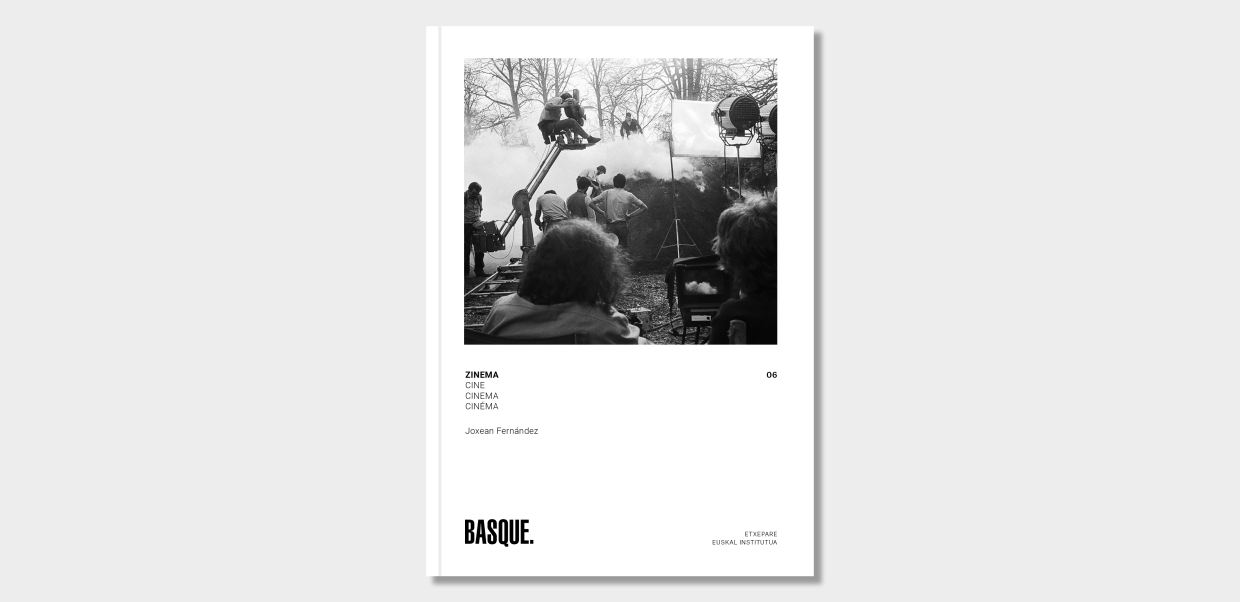Book: Basque cinema
Euskara. Kultura. Mundura.

This is a general overview of the history of the cinema in the Basque Country, focusing on its main filmmakers since its first steps to the present. It does not attempt to be a critical analysis or offer groundbreaking research on the topic. Instead, its point of departure is to allow curious readers to extend their understanding at a later date through other more ambitious and detailed studies.
This swift journey –which logically lacks any detailed close-ups—will begin by exploring the origins of cinema in the Basque Country up to the end of the silent era, the outbreak of the Spanish Civil War and the subsequent Basque cinematographic propaganda. It will then traverse the wasteland resulting from Franco’s repression through to the first bold awakenings during the agonizing era of the dictatorship, the intense debate about the nature of Basque cinema during the transition to democracy, the determined emergence of Basque cinema coinciding with the start of the autonomous era, and the first steps of the key artists of 1990s, until arriving at the shaping of the diverse current reality. It is, then, a journey, starting with ´Edurne, modista bilbaína´ (´Edurne, Bilbao dressmaker´, 1924) by Telesforo Gil and ´El mayorazgo de Basterreche´ (´The Basterreche heir´, 1928) by the Azcona brothers, to ´Tasio´ (1984) by Montxo Armendáriz and ´80 egunean´ (´For 80 days´, 2010) by Jon Garaño and José Mari Goenaga, to cite but a few examples.
This journey will be undertaken from the perspective and methodology of a historian rather than a film critic. Thus, it will look for the numerous close links between contemporary Basque history and the history of Basque cinema, rather than just offering personal views on the artistic quality of Basque films.
Author: Joxean Fernández, Director of the Basque Film Archive
Joxean Fernández (Donostia / San Sebastián, 1973) is the head of the Basque Film Archive since December 2010 and member of the Management Committee of the San Sebastian International Film Festival since January 2011. Senior lecturer (currently on leave of absence) at the University of Nantes, specialising in Contemporary History and the History of Cinema. Holder of a PhD from the University of Zaragoza and the University of Nantes with a jointly supervised doctoral thesis titled ´Cinema and Civil War in the Basque Country (1936-2006)´. Member since 2001 of the management committee of the Nantes Festival of Spanish Cinema and promoter therein of the Basque Window section. He co-directed with Marta Horno the documentary ´A las puertas de París´ (2008). The author of numerous articles on the contemporary history of the Basque Country and cinema and the coordinator of the following books: ´Federico Fellini and Luis Buñuel´ (both together with Jesús Angulo), ´Cine y Guerra Civil en el País Vasco´ (with Santiago de Pablo), ´Conservación audiovisual en la era digital´ (with Alfonso del Amo), ´De Lumière a Kaurismäki´ and ´La clase obrera en el cine´ (with Carlos F. Heredero). He is, moreover, the editor of ´Cine vasco: tres generaciones de cineastas´ and author of the book ´Euskal Zinema - Cine Vasco - Basque Cinema´. He has been a visiting professor occupying the Bernardo Atxaga Chair at the City University of New York (CUNY) in 2012 and 2017. He has collaborated on the launch of the Elías Querejeta Film School and forms part of its Academic Management.